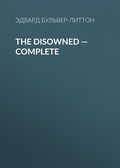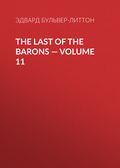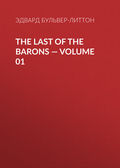
Эдвард Бульвер-Литтон
Devereux — Volume 03
CHAPTER III
A GREAT CHANGE OF PROSPECTS
I SHUT myself up in the apartments prepared for me (they were not those I had formerly occupied), and refused all participation in my solitude, till, after an interval of some days, my mother came to summon me to the opening of the will. She was more moved than I had expected. "It is a pity," said she, as we descended the stairs, "that Aubrey is not here, and that we should be so unacquainted with the exact place where he is likely to be that I fear the letter I sent him may be long delayed, or, indeed, altogether miscarry."
"Is not the Abbe here?" said I, listlessly.
"No!" answered my mother, "to be sure not."
"He has /been/ here," said I, greatly surprised. "I certainly saw him on the day of my arrival."
"Impossible!" said my mother, in evident astonishment; and seeing that, at all events, she was unacquainted with the circumstance, I said no more.
The will was to be read in the little room where my uncle had been accustomed to sit. I felt it as a sacrilege to his memory to choose that spot for such an office, but I said nothing. Gerald and my mother, the lawyer (a neighbouring attorney, named Oswald), and myself were the only persons present. Mr. Oswald hemmed thrice, and broke the seal. After a preliminary, strongly characteristic of the testator, he came to the disposition of the estates. I had never once, since my poor uncle's death, thought upon the chances of his will; indeed, knowing myself so entirely his favourite, I could not, if I had thought upon them, have entertained a doubt as to their result. What then was my astonishment when, couched in terms of the strongest affection, the whole bulk of the property was bequeathed to Gerald; to Aubrey the sum of forty, to myself that of twenty thousand pounds (a capital considerably less than the yearly income of my uncle's princely estates), was allotted. Then followed a list of minor bequests,—to my mother an annuity of three thousand a year, with the privilege of apartments in the house during her life; to each of the servants legacies sufficient for independence; to a few friends, and distant connections of the family, tokens of the testator's remembrance,—even the horses to his carriage, and the dogs that fed from his menials' table, were not forgotten, but were to be set apart from work, and maintained in indolence during their remaining span of life. The will was concluded: I could not believe my senses; not a word was said as a reason for giving Gerald the priority.
I rose calmly enough. "Suffer me, Sir," said I to the lawyer, "to satisfy my own eyes." Mr. Oswald bowed, and placed the will in my hands. I glanced at Gerald as I took it: his countenance betrayed, or feigned, an astonishment equal to my own. With a jealous, searching, scrutinizing eye, I examined the words of the bequest; I examined especially (for I suspected that the names must have been exchanged) the place in which my name and Gerald's occurred. In vain: all was smooth and fair to the eye, not a vestige of possible erasure or alteration was visible. I looked next at the wording of the will: it was evidently my uncle's; no one could have feigned or imitated the peculiar turn of his expressions; and, above all, many parts of the will (the affectionate and personal parts) were in his own handwriting.
"The date," said I, "is, I perceive, of very recent period; the will is signed by two witnesses besides yourself. Who and where are they?"
"Robert Lister, the first signature, my clerk; he is since dead, Sir."
"Dead!" said I; "and the other witness, George Davis?"
"Is one of Sir William's tenants, and is below, Sir, in waiting."
"Let him come up," and a middle-sized, stout man, with a blunt, bold, open countenance, was admitted.
"Did you witness this will?" said I.
"I did, your honour!"
"And this is your handwriting?" pointing to the scarcely legible scrawl.
"Yees, your honour," said the man, scratching his head, "I think it be; they are my /ees/, and G, and D, sure enough."
"And do you know the purport of the will you signed?"
"Anan!"
"I mean, do you know to whom Sir William—stop, Mr. Oswald, suffer the man to answer me—to whom Sir William left his property?"
"Noa, to be sure, Sir; the will was a woundy long one, and Maister Oswald there told me it was no use to read it over to me, but merely to sign, as a witness to Sir William's handwriting."
"Enough: you may retire;" and George Davis vanished.
"Mr. Oswald," said I, approaching the attorney, "I may wrong you, and if so, I am sorry for it, but I suspect there has been foul practice in this deed. I have reason to be convinced that Sir William Devereux could never have made this devise. I give you warning, Sir, that I shall bring the business immediately before a court of law, and that if guilty—ay, tremble, Sir—of what I suspect, you will answer for this deed at the foot of the gallows."
I turned to Gerald, who rose while I was yet speaking. Before I could address him, he exclaimed, with evident and extreme agitation,
"You cannot, Morton,—you cannot—you dare not—insinuate that I, your brother, have been base enough to forge, or to instigate the forgery of, this will?"
Gerald's agitation made me still less doubtful of his guilt.
"The case, Sir," I answered coldly, "stands thus: my uncle could not have made this will; it is a devise that must seem incredible to all who knew aught of our domestic circumstances. Fraud has been practised, how I know not; by whom I do know."
"Morton, Morton: this is insufferable; I cannot bear such charges, even from a brother."
"Charges!—your conscience speaks, Sir,—not I; no one benefits by this fraud but you: pardon me if I draw an inference from a fact."
So saying, I turned on my heel, and abruptly left the apartment. I ascended the stairs which led to my own: there I found my servant preparing the paraphernalia in which that very evening I was to attend my uncle's funeral. I gave him, with a calm and collected voice, the necessary instructions for following me to town immediately after that event, and then I passed on to the room where the deceased lay in state. The room was hung with black: the gorgeous pall, wrought with the proud heraldry of our line, lay over the coffin; and by the lights which made, in that old chamber, a more brilliant, yet more ghastly, day, sat the hired watchers of the dead.
I bade them leave me, and kneeling down beside the coffin, I poured out the last expressions of my grief. I rose, and was retiring once more to my room, when I encountered Gerald.
"Morton," said he, "I own to you, I myself am astounded by my uncle's will. I do not come to make you offers; you would not accept them: I do not come to vindicate myself, it is beneath me; and we have never been as brothers, and we know not their language: but I /do/ come to demand you to retract the dark and causeless suspicions you have vented against me, and also to assure you that, if you have doubts of the authenticity of the will, so far from throwing obstacles in your way, I myself will join in the inquiries you institute and the expenses of the law."
I felt some difficulty in curbing my indignation while Gerald thus spoke. I saw before me the persecutor of Isora, the fraudulent robber of my rights, and I heard this enemy speak to me of aiding in the inquiries which were to convict himself of the basest, if not the blackest, of human crimes; there was something too in the reserved and yet insolent tone of his voice which, reminding me as it did of our long aversion to each other, made my very blood creep with abhorrence. I turned away, that I might not break my oath to Isora, for I felt strongly tempted to do so; and said in as calm an accent as I could command, "The case will, I trust, require no king's evidence; and, at least, I will not be beholden to the man whom my reason condemns for any assistance in bringing upon himself the ultimate condemnation of the law."
Gerald looked at me sternly. "Were you not my brother," said he, in a low tone, "I would, for a charge so dishonouring my fair name, strike you dead at my feet."
"It is a wonderful exertion of fraternal love," I rejoined, with a scornful laugh, but an eye flashing with passions a thousand times more fierce than scorn, "that prevents your adding that last favour to those you have already bestowed on me."
Gerald, with a muttered curse, placed his hand upon his sword; my own rapier was instantly half drawn, when, to save us from the great guilt of mortal contest against each other, steps were heard, and a number of the domestics charged with melancholy duties at the approaching rite, were seen slowly sweeping in black robes along the opposite gallery. Perhaps that interruption restored both of us to our senses, for we said, almost in the same breath, and nearly in the same phrase, "This way of terminating strife is not for us;" and, as Gerald spoke, he turned slowly away, descended the staircase, and disappeared.
The funeral took place at night: a numerous procession of the tenants and peasantry attended. My poor uncle! there was not a dry eye for thee, but those of thine own kindred. Tall, stately, erect in the power and majesty of his unrivalled form, stood Gerald, already assuming the dignity and lordship which, to speak frankly, so well became him; my mother's face was turned from me, but her attitude proclaimed her utterly absorbed in prayer. As for myself, my heart seemed hardened: I could not betray to the gaze of a hundred strangers the emotions which I would have hidden from those whom I loved the most. Wrapped in my cloak, with arms folded on my breast, and eyes bent to the ground, I leaned against one of the pillars of the chapel, apart, and apparently unmoved.
But when they were about to lower the body into the vault, a momentary weakness came over me. I made an involuntary step forward, a single but deep groan of anguish broke from me, and then, covering my face with my mantle, I resumed my former attitude, and all was still. The rite was over; in many and broken groups the spectators passed from the chapel: some to speculate on the future lord, some to mourn over the late, and all to return the next morning to their wonted business, and let the glad sun teach them to forget the past, until for themselves the sun should be no more, and the forgetfulness eternal.
The hour was so late that I relinquished my intention of leaving the house that night; I ordered my horse to be in readiness at daybreak and before I retired to rest I went to my mother's apartments: she received me with more feeling than she had ever testified before.
"Believe me, Morton," said she, and she kissed my forehead; "believe me, I can fully enter into the feelings which you must naturally experience on an event so contrary to your expectations. I cannot conceal from you how much I am surprised. Certainly Sir William never gave any of us cause to suppose that he liked either of your brothers—Gerald less than Aubrey—so much as yourself; nor, poor man, was he in other things at all addicted to conceal his opinions."
"It is true, my mother," said I; "it is true. Have you not therefore some suspicions of the authenticity of the will?"
"Suspicions!" cried my mother. "No!—impossible!—suspicions of whom? You could not think Gerald so base, and who else had an interest in deception? Besides, the signature is undoubtedly Sir William's handwriting, and the will was regularly witnessed; suspicions, Morton,—no, impossible! Reflect, too, how eccentric and humoursome your uncle always was: suspicions!—no, impossible!"
"Such things have been, my mother, nor are they uncommon: men will hazard their souls, ay, and what to some are more precious still, their lives too, for the vile clay we call money. But enough of this now: the Law,—that great arbiter,—that eater of the oyster, and divider of its shells,—the Law will decide between us, and if against me, as I suppose and fear the decision will be,—why, I must be a suitor to fortune instead of her commander. Give me your blessing, my dearest mother: I cannot stay longer in this house; to-morrow I leave you."
And my mother did bless me, and I fell upon her neck and clung to it.
"Ah!" thought I, "this blessing is almost worth my uncle's fortune."
I returned to my room; there I saw on the table the case of the sword sent me by the French king. I had left it with my uncle, on my departure to town, and it had been found among his effects and reclaimed by me. I took out the sword, and drew it from the scabbard. "Come," said I, and I kindled with a melancholy yet a deep enthusiasm, as I looked along the blade, "come, my bright friend, with thee through this labyrinth which we call the world will I carve my way! Fairest and speediest of earth's levellers, thou makest the path from the low valley to the steep hill, and shapest the soldier's axe into the monarch's sceptre! The laurel and the fasces, and the curule car, and the emperor's purple,—what are these but thy playthings, alternately thy scorn and thy reward! Founder of all empires, propagator of all creeds, thou leddest the Gaul and the Goth, and the gods of Rome and Greece crumbled upon their altars! Beneath thee the fires of the Gheber waved pale, and on thy point the badge of the camel-driver blazed like a sun over the startled East! Eternal arbiter, and unconquerable despot, while the passions of mankind exist! Most solemn of hypocrites, —circling blood with glory as with a halo; and consecrating homicide and massacre with a hollow name, which the parched throat of thy votary, in the battle and the agony, shouteth out with its last breath! Star of all human destinies! I kneel before thee, and invoke from thy bright astrology an omen and a smile."
CHAPTER IV
AN EPISODE.—THE SON OF THE GREATEST MAN WHO (ONE ONLY EXCEPTED) /EVER ROSE TO A THRONE/, BUT BY NO MEANS OF THE GREATEST MAN (SAVE ONE) WHO /EVER EXISTED/
BEFORE sunrise the next morning I had commenced my return to London. I had previously intrusted to the /locum tenens/ of the sage Desmarais, the royal gift, and (singular conjunction!) poor Ponto, my uncle's dog. Here let me pause, as I shall have no other opportunity to mention him, to record the fate of the canine bequest. He accompanied me some years afterwards to France, and he died there in extreme age. I shed tears as I saw the last relic of my poor uncle expire, and I was not consoled even though he was buried in the garden of the gallant Villars, and immortalized by an epitaph from the pen of the courtly Chaulieu.
Leaving my horse to select his own pace, I surrendered myself to reflection upon the strange alteration that had taken place in my fortunes. There did not, in my own mind, rest a doubt but that some villany had been practised with respect to the will. My uncle's constant and unvarying favour towards me; the unequivocal expressions he himself from time to time had dropped indicative of his future intentions on my behalf; the easy and natural manner in which he had seemed to consider, as a thing of course, my heritage and succession to his estates; all, coupled with his own frank and kindly character, so little disposed to raise hopes which he meant to disappoint, might alone have been sufficient to arouse my suspicions at a devise so contrary to all past experience of the testator. But when to these were linked the bold temper and the daring intellect of my brother, joined to his personal hatred to myself; his close intimacy with Montreuil, whom I believed capable of the darkest designs; the sudden and evidently concealed appearance of the latter on the day my uncle died; the agitation and paleness of the attorney; the enormous advantages accruing to Gerald, and to no one else, from the terms of the devise: when these were all united into one focus of evidence, they appeared to me to leave no doubt of the forgery of the testament and the crime of Gerald. Nor was there anything in my brother's bearing and manner calculated to abate my suspicions. His agitation was real; his surprise might have been feigned; his offer of assistance in investigation was an unmeaning bravado; his conduct to myself testified his continued ill-will towards me,—an ill-will which might possibly have instigated him in the fraud scarcely less than the whispers of interest and cupidity.
But while this was the natural and indelible impression on my mind, I could not disguise from myself the extreme difficulty I should experience in resisting my brother's claim. So far as my utter want of all legal knowledge would allow me to decide, I could perceive nothing in the will itself which would admit of a lawyer's successful cavil: my reasons for suspicion, so conclusive to myself, would seem nugatory to a judge. My uncle was known as a humourist; and prove that a man differs from others in one thing, and the world will believe that he differs from them in a thousand. His favour to me would be, in the popular eye, only an eccentricity, and the unlooked-for disposition of his will only a caprice. Possession, too, gave Gerald a proverbial vantage-ground, which my whole life might be wasted in contesting; while his command of an immense wealth might, more than probably, exhaust my spirit by delay, and my fortune by expenses. Precious prerogative of law, to reverse the attribute of the Almighty! to fill the /rich/ with good things, but to send the poor empty away! /In corruptissima republica plurimoe leges/. Legislation perplexed is synonymous with crime unpunished,—a reflection, by the way, I should never have made, if I had never had a law-suit: sufferers are ever reformers.
Revolving, then, these anxious and unpleasing thoughts, interrupted, at times, by regrets of a purer and less selfish nature for the friend I had lost, and wandering, at others, to the brighter anticipations of rejoining Isora, and drinking from her eyes my comfort for the past and my hope for the future, I continued and concluded my day's travel.
The next day, on resuming my journey, and on feeling the time approach that would bring me to Isora, something like joy became the most prevalent feeling in my mind. So true it is that misfortunes little affect us so long as we have some ulterior object, which, by arousing hope, steals us from affliction. Alas! the pang of a moment becomes intolerable when we know of nothing /beyond/ the moment which it soothes us to anticipate! Happiness lives in the light of the future: attack the present; she defies you! darken the future, and you destroy her!
It was a beautiful morning: through the vapours, which rolled slowly away beneath his beams, the sun broke gloriously forth; and over wood and hill, and the low plains, which, covered with golden corn, stretched immediately before me, his smile lay in stillness, but in joy. And ever from out the brake and the scattered copse, which at frequent intervals beset the road, the merry birds sent a fitful and glad music to mingle with the sweets and freshness of the air.
I had accomplished the greater part of my journey, and had entered into a more wooded and garden-like description of country, when I perceived an old man, in a kind of low chaise, vainly endeavouring to hold in a little but spirited horse, which had taken alarm at some object on the road, and was running away with its driver. The age of the gentleman and the lightness of the chaise gave me some alarm for the safety of the driver; so, tying my own horse to a gate, lest the sound of his hoofs might only increase the speed and fear of the fugitive, I ran with a swift and noiseless step along the other side of the hedge and, coming out into the road just before the pony's head, I succeeded in arresting him, at a rather critical spot and moment. The old gentleman very soon recovered his alarm; and, returning me many thanks for my interference, requested me to accompany him to his house, which he said was two or three miles distant.
Though I had no desire to be delayed in my journey for the mere sake of seeing an old gentleman's house, I thought my new acquaintance's safety required me, at least, to offer to act as his charioteer till we reached his house. To my secret vexation at that time, though I afterwards thought the petty inconvenience was amply repaid by a conference with a very singular and once noted character, the offer was accepted. Surrendering my own steed to the care of a ragged boy, who promised to lead it with equal judgment and zeal, I entered the little car, and, keeping a firm hand and constant eye on the reins, brought the offending quadruped into a very equable and sedate pace.
"Poor Bob," said the old gentleman, apostrophizing his horse; "poor Bob, like thy betters, thou knowest the weak hand from the strong; and when thou art not held in by power, thou wilt chafe against love; so that thou renewest in my mind the remembrance of its favourite maxim, namely, 'The only preventive to rebellion is restraint!'"
"Your observation, Sir," said I, rather struck by this address, "makes very little in favour of the more generous feelings by which we ought to be actuated. It is a base mind which always requires the bit and bridle."
"It is, Sir," answered the old gentleman; "I allow it: but, though I have some love for human nature, I have no respect for it; and while I pity its infirmities, I cannot but confess them."
"Methinks, Sir," replied I, "that you have uttered in that short speech more sound philosophy than I have heard for months. There is wisdom in not thinking too loftily of human clay, and benevolence in not judging it too harshly, and something, too, of magnanimity in this moderation; for we seldom contemn mankind till they have hurt us, and when they have hurt us, we seldom do anything but detest them for the injury."
"You speak shrewdly; Sir, for one so young," returned the old man, looking hard at me; "and I will be sworn you have suffered some cares; for we never begin to think till we are a little afraid to hope."
I sighed as I answered, "There are some men, I fancy, to whom constitution supplies the office of care; who, naturally melancholy, become easily addicted to reflection, and reflection is a soil which soon repays us for whatever trouble we bestow upon its culture."
"True, Sir!" said my companion; and there was a pause. The old gentleman resumed: "We are not far from my home now (or rather my temporary residence, for my proper and general home is at Cheshunt, in Hertfordshire); and, as the day is scarcely half spent, I trust you will not object to partake of a hermit's fare. Nay, nay, no excuse: I assure you that I am not a gossip in general, or a liberal dispenser of invitations; and I think, if you refuse me now, you will hereafter regret it."
My curiosity was rather excited by this threat; and, reflecting that my horse required a short rest, I subdued my impatience to return to town, and accepted the invitation. We came presently to a house of moderate size, and rather antique fashion. This, the old man informed me, was his present abode. A servant, almost as old as his master, came to the door, and, giving his arm to my host, led him, for he was rather lame and otherwise infirm, across a small hall into a long low apartment. I followed.
A miniature of Oliver Cromwell, placed over the chimney-piece, forcibly arrested my attention.
"It is the only portrait of the Protector I ever saw," said I, "which impresses on me the certainty of a likeness; that resolute gloomy brow,—that stubborn lip,—that heavy, yet not stolid expression,—all seem to warrant a resemblance to that singular and fortunate man, to whom folly appears to have been as great an instrument of success as wisdom, and who rose to the supreme power perhaps no less from a pitiable fanaticism than an admirable genius. So true is it that great men often soar to their height by qualities the least obvious to the spectator, and (to stoop to a low comparison) resemble that animal3 in which a common ligament supplies the place and possesses the property of wings."
The old man smiled very slightly as I made this remark. "If this be true," said he, with an impressive tone, "though we may wonder less at the talents of the Protector, we must be more indulgent to his character, nor condemn him for insincerity when at heart he himself was deceived."
"It is in that light," said I, "that I have always viewed his conduct. And though myself, by prejudice, a Cavalier and a Tory, I own that Cromwell (hypocrite as he is esteemed) appears to me as much to have exceeded his royal antagonist and victim in the virtue of sincerity, as he did in the grandeur of his genius and the profound consistency of his ambition."







